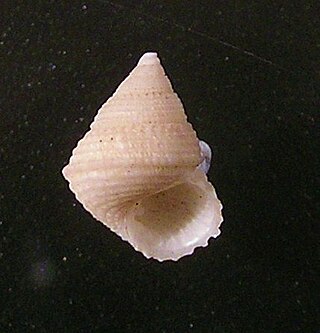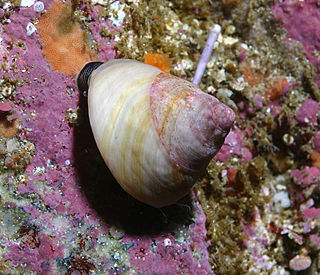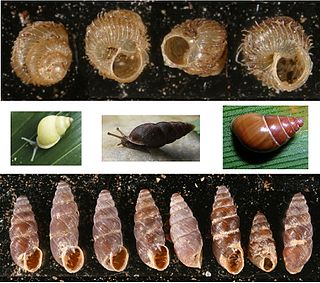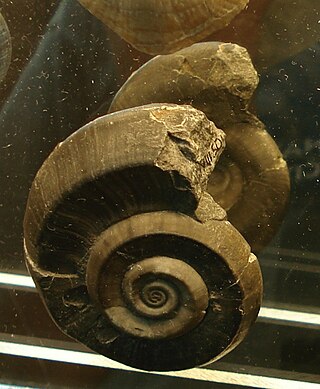
The Bellerophontidae are an extinct family of specialized globose bellerophontids, Paleozoic and early Triassic mollusks of the class Gastropoda.

Neritoidea is a taxonomic superfamily of mostly sea snails, nerites and their allies, marine gastropod mollusks in the order Cycloneritida.

Chilodontaidae is a taxonomic family of mostly small deepwater sea snails, marine gastropod molluscs in the clade Vetigastropoda.

Trochoidea is a superfamily of small to very large vetigastropod sea snails with gills and an operculum. Species within this superfamily have nacre as the inner shell layer. The families within this superfamily include the Trochidae, the top snails. This superfamily is the largest vetigastropodan superfamily, containing more than 2,000 species.

Helcionelloida is an extinct group of ancient molluscs. These are the oldest known conchiferan molluscs, that is, they had a mineralised shell. Some members of this class were mistaken for Monoplacophorans. The class was erected by Peel in 1991.

Eotomariidae is an extinct family of gastropods in the clade Vetigastropoda.

Eucyclidae is a family of gastropods in the superfamily Seguenzioidea.

Sphincterochilidae is a taxonomic family of medium-sized air-breathing land snails, terrestrial pulmonate gastropod mollusks in the superfamily Helicoidea.

Coreospiridae is an extinct family of Paleozoic molluscs of uncertain position taxonomically. They might be snails (Gastropoda), Helcionelloida, or they might be Monoplacophora.

Orthurethra is a clade of air-breathing land snails, terrestrial pulmonate gastropod mollusks in the clade Stylommatophora.

Eotomarioidea is an extinct superfamily of small to large sea snails, marine gastropod mollusks in the clade Vetigastropoda.

Pupilloidea is a superfamily of small and very small air-breathing land snails, terrestrial gastropod mollusks in the infraorder Pupilloidei.
†Oriostomatoidea is an extinct superfamily of fossil sea snails, marine gastropod mollusks in the clade Neritimorpha.
Metoptomatidae is an extinct family of fossil mollusks from the Paleozoic era. These mollusks are either.
Euphemitidae is an extinct family of Paleozoic fossil molluscs of uncertain position. They have isostrophically coiled shells and may be either Gastropoda sea (snail)s, or Monoplacophora.
Omphalocirridae is an extinct family of Paleozoic molluscs (gastropods?) with anisostrophically coiled shells of uncertain position (Gastropoda?).
Helicotomidae is an extinct family of Paleozoic molluscs (gastropods?) with anisostrophically coiled shells of uncertain position (Gastropoda?).
The †Raphistomatidae is a taxonomic family of fossil sea snails, Paleozoic marine gastropod molluscs. This family was established by Koken in 1896. This family is found in the fossil record from the Upper Cambrian to the Middle Permian.

Euomphaloidea, originally Euomphalacea, is an extinct superfamily of marine molluscs that lived from the Early Ordovician to the Late Cretaceous, included in the Gastropoda but speculated as instead perhaps Monoplacophora.
The taxonomy of the Gastropoda as it was revised in December 2017 by Philippe Bouchet and eight other authors, is a publication which lays out a newly revised system for the scientific classification of gastropod mollusks. The same work also included the taxonomy of monoplacophorans.










